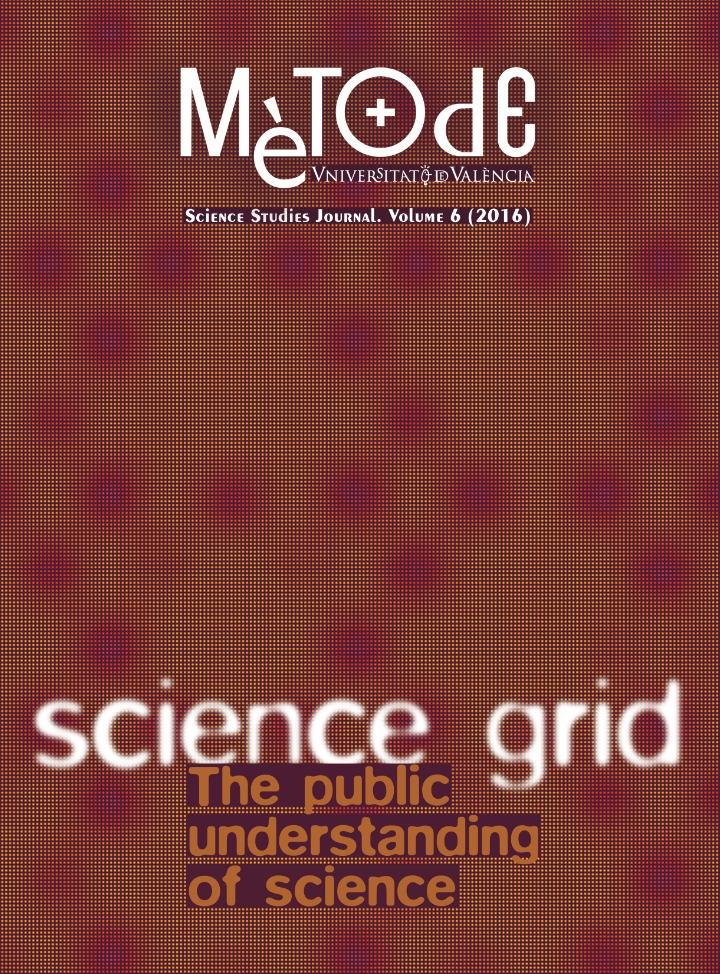Reflections on the origin of life: More than an 'evolutionary' problem
DOI:
https://doi.org/10.7203/metode.6.4997Keywords:
Self-organisation, protocells, metabolism, phenotypic/functional diversity, open evolution Abstract
Abstract
This paper argues that the question of the origin of life cannot be explained by appealing exclusively to Darwinian evolutionary mechanisms, as many experts tend to assume, but requires a profound change in perspective. Accordingly, we highlight the fact that, in order to operate as a diversification force (and indirectly, a force for a potential increase in complexity), natural selection requires a number of conditions to be met in order for it to be possible: specifically, self-sustained and self-(re-)productive chemical organisation within a sufficiently large phenotypic space (that is, a wide range of functions). Therefore, we suggest an extension of the «self-organising» paradigm towards a «self-(re-)productive» one as an alternative to the main proposals regarding the origin of life, based on molecular populations (typically RNA) subject to Darwinian evolution. Such a paradigm would adequately portray the specificity of the biological phenomenon (particularly, its metabolic and cellular dimension) and would be relevant before, during, and after natural selection started to operate.
 Downloads
Downloads
 References
References
Eigen, M., & Schuster, P. (1979). The Hypercycle: A principle of natural self-organization. New York: Springer.
Fry, I. (2000). The emergence of life on Earth: A historical and scientific overview. New Brunswick: Rutgers University Press.
Karsenti, E. (2008). Self-organization in cell biology. A brief history. Nature Reviews Molecular Cell Biology, 9, 255–262. doi: 10.1038/nrm2357
Kauffman, S., & Clayton, P. (2006). Agency, emergence and organization. Biology and Philosophy, 21, 501–521. doi: 10.1007/s10539-005-9003-9
Keller, E. F. (2007). The disappearance of function from ‘self-organizing systems’. In F. Boogerd, J. H. Bruggeman, H. V. Hofmeyr, & H. Westerhoff (Eds.), Systems biology. Philosophical foundations. (pp. 303–318). Dordrecht: Elsevier.
Lewontin, R. (1970). The units of selection. Annual Reviews of Ecology and Systematics, 1, 1–18. doi: 10.1146/annurev.es.01.110170.000245
Monod, J. (1970). Le hasard et la nécessité. Essai sur la philosophie naturelle de la biologie moderne. Paris: Éditions du Seuil.
Moreno, A., & Ruiz-Mirazo, K. (2009). The problem of the emergence of functional diversity in prebiotic evolution. Biology and Philosophy, 24(5), 585–605. doi: 10.1007/s10539-009-9178-6
Nagel, T. (2012). Mind and cosmos. Why the materialist neo-Darwinian conception of nature is almost certainly false. Oxford: Oxford University Press
Orgel, L. E. (1992). Molecular replication. Nature, 358, 203–209. doi: 10.1038/358203a0
Pattee, H. H. (1969). How does a molecule become a message? Developmental Biology Supplement, 3, 1–16.
Peretó, J., Bada, J. L., & Lazcano, A. (2009). Charles Darwin and the origin of life. Origins of Life and Evolution of Biospheres, 39(5), 395–406. doi: 10.1007/s11084-009-9172-7
Ruiz-Mirazo, K., & Moreno, A. (2012). Autonomy in evolution: From minimal to complex life. Synthese, 185(1): 21–52.
Simon, H. (1962). The architecture of complexity. Proceedings of the American Philosophical Society, 106, 467–482.
Szostak, J. W., (2012). The eightfold path to non-enzymatic RNA replication. Journal of Systems Chemistry, 3, 2. doi: 10.1186/1759-2208-3-2
Wicken, J. S., (1987). Evolution, thermodynamics and information. Extending the Darwinian program. Oxford: Oxford University Press.
Downloads
Published
How to Cite
-
Abstract6284
-
PDF1613
Issue
Section
License
![]()
All the documents in the OJS platform are open access and property of their respective authors.
Authors publishing in the journal agree to the following terms:
- Authors keep the rights and guarantee Metode Science Studies Journal the right to be the first publication of the document, licensed under a Creative Commons Attribution-NonCommercial-NoDerivatives 4.0 International License that allows others to share the work with an acknowledgement of authorship and publication in the journal.
- Authors are allowed and encouraged to spread their work through electronic means using personal or institutional websites (institutional open archives, personal websites or professional and academic networks profiles) once the text has been published.





